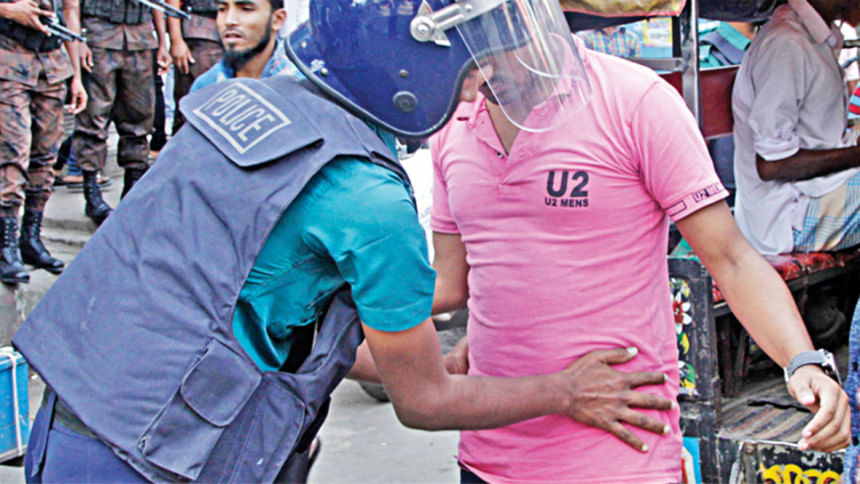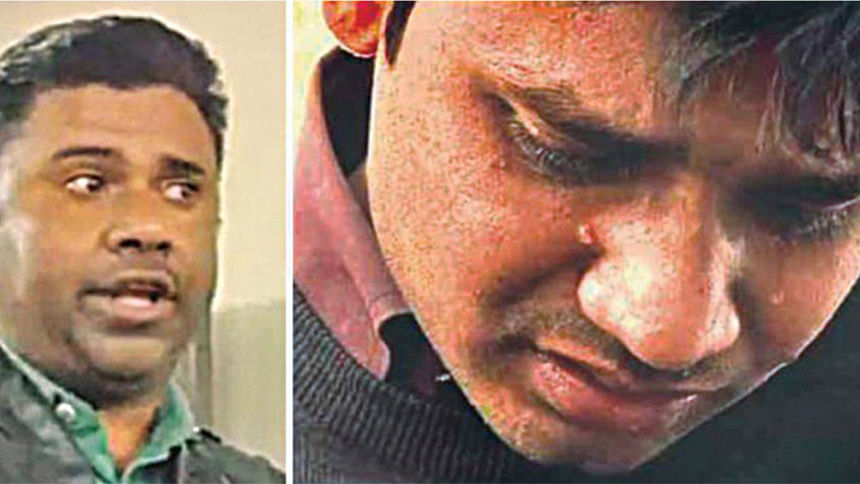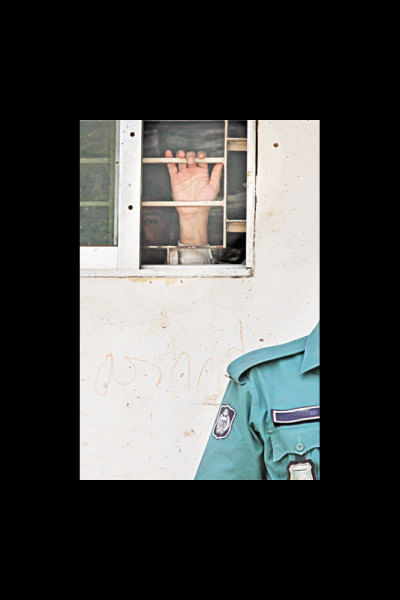OUR BACKS ARE UP AGAINST THE WALL

Photos: Prabir Das
It was late at night and crowds in the streets of Dhaka's Mohammadpur residential area had thinned. After a tedious day followed by an exciting badminton match, Golam Rabbi, a 27-year-old officer of Bangladesh Bank, was returning home. Suddenly, he remembered that he forgot to collect the money to pay the rent of his shared single room apartment. So, he went to the nearest ATM booth to draw some money without noticing that he was being watched and followed.
As soon as he went out from the booth, someone nabbed him from behind and said, "Hey you, come with us. Our officer wants to talk to you."
"I was startled but when I saw two police constables, I went with them", says Rabbi. "And then, when I reached the police van, the Sub Inspector (SI) and his men started to search my whole body and said, "Tell us where you have hid the Yaba (meth tablets) and the weapons?" says Rabbi.

Shocked at their approach, he showed them his identity card of Bangladesh Bank and told them that he was a student of Dhaka University and also a journalist. But it further infuriated those corrupted policemen.
"They started to punch me and hit me with rods and rifle butts. Giving me no chance to defend myself, they dragged and locked me up in their van and were continuously blaming me for possessing Yaba and weapons. But the fact is -- let alone drugs and alcohol, I never smoked a cigarette in my life", says a traumatised Rabby, lying and weeping in the hospital bed.
It was only the beginning of the horrible night. For five hours Rabby was tortured by those policemen and repeatedly threatened to be killed in the name of crossfire if he could not give five hundred thousand takas to SI Masud Shikder, the officer whose men picked up Rabby.
Finally, thanks to his popular appearance as a news-presenter at one of the country's reputed news channels, his popularity as a youth activist at Dhaka University and status as a promising officer of the country's central bank, Rabby managed to garner huge support from the mass media and was finally released.
However, over the last few years we have witnessed plenty of unfortunate examples of common people falling victim to brutal misconducts of the law enforcers. Even just a week after the dreadful incident with Rabby, a city corporation official named Bikash Chandra Das was beaten to unconsciousness by a police patrol in Jatrabari area. And memories of Abdul Kader a student of Dhaka University arrested without any charge and brutally tortured in police custody, the young teen-aged boy Limon who was shot in cold blood by the men of Rapid Action Battalion and lost one of his legs, auto-rickshaw driver Md Shah Alam shot in the leg and held with false charge of carrying pistol are still fresh in our minds.
After each of these incidents we get conventional messages from the police high ups, "If found guilty after investigation, departmental action will be taken against the involved individual". However, the increasing rate of these incidents clearly show that these "departmental actions" have failed to prevent the police officers from indulging in such crimes that have turned the law enforcing agency into a force of terror and oppression to common people. The mentality of these corrupt and misguided policemen is clearly reflected by the statement of an eyewitness of the incident that happened with the city corporation official Bikash. He informed that while beating poor Bikash the policemen were saying, "Hilsha is the king of the fish and police is the king of Bangladesh."
Professor Dr Mizanur Rahman, the chairman of National Human Rights Commission rightly says, "A state of impunity has engulfed the psyche of the members of the country's law enforcing agencies. They have started to think that no one in the country will be able to touch them and they can get away with any crime. This is very unfortunate and if this continues people will start to lose faith on these agencies who are meant to be friends of the people."
The origin of this culture of impunity actually lies in the country's legislation. The section 54 of the Code of Criminal Procedure (CrPC) and Special Power Act, 1974 gave the law enforcers an indefinite authority to arrest anyone without any order from the court. And section 167 of CrPC allows the law enforcers to apply force on the arrestees to extract information by making a prayer for remand to the magistrate. However, in this section 167, there is no guideline when this kind of prayer should be accepted and when it can be rejected. So, both magistrates and police get the chance to apply their power arbitrarily.

To prevent abuse of these acts, Bangladesh Legal Aid and Services Trust (BLAST), Ain o Salish Kendra, Shommilito Shamajik Andolon and several individuals filed a writ petition in the high court in 1998 after a university student was killed in police custody. In 2003, the high court issued a directive laying down a set of fifteen guidelines for the law enforcers to apply the powers of arrest and remand.
However, a recent research by BLAST has revealed that law enforcing agencies and even the magistrates are completely oblivious to these guidelines. It is found in the research that, law enforcers do not inform the arrestees about the reason of being arrested in 58 percent of the arrests under section 54 and in 90 percent of the cases they do not inform the family members or a lawyer of the arrestee about the arrest although these are some of the basic points mentioned in the directives.
Former Inspector General of Police Muhammad Nurul Huda says, "To stop these incidents of power abuse, there is no alternative of maintaining quality in recruitment, transparent supervision and sufficient training of the police personnel about human rights issues." However, recent reports reveal a bleak scenario in this regard. A report by Prothom Alo regarding recruitment in the police (October 24, 2013) shows, SI candidates from some particular districts including Gopalganj, which are the hometowns of influential political leaders in power, topped the merit list.
After completing a year of training, these SI's, recruited by the blessings of their political connections instead of quality, are now on duty all over the country. A high ranking police officer says anonymously, "Sub inspectors (SI) of police are recruited by the police department itself. As a result, recommendations from high ranking officials and influential political leaders cannot be avoided all the time."
"These irregularities in recruitment, affects the chain of command severely. The incidents of not carrying out orders by the newly recruited SIs who have connections with the high ups are becoming frequent in the police department", he adds.
While visiting Rabby and Bikash in the hospital the chairman of human rights commission Professor Dr Mizanur Rahman promised that he would take steps to cover the medical costs of those victims and would recommend to the appropriate authority so that they could be compensated.
However, it is a fact that most of the people are not fortunate enough to get media coverage like Rabby, Limon or Abdul Kader. For these helpless victims nobody pops up with the sweet promises of compensation. On the contrary, most of these victims do not even file a case against the perpetrators in uniform in fear of further harassment by their colleagues. If this kind of corruption and the culture of impunity in the law enforcing agencies cannot be stopped, if the inhuman legal provisions which curb the citizen rights ensured by the constitution cannot be withdrawn, these kinds of dreadful incidents will continue and it's consequence in the society will be dreadful.
It is high time that human rights activists, civil society members and people in general come forward and pressurise the state to withdraw the punitive, undemocratic legal provisions and reform the law enforcing agencies so that never again its members can victimise innocent people and cause terror in the society.

 For all latest news, follow The Daily Star's Google News channel.
For all latest news, follow The Daily Star's Google News channel. 



Comments